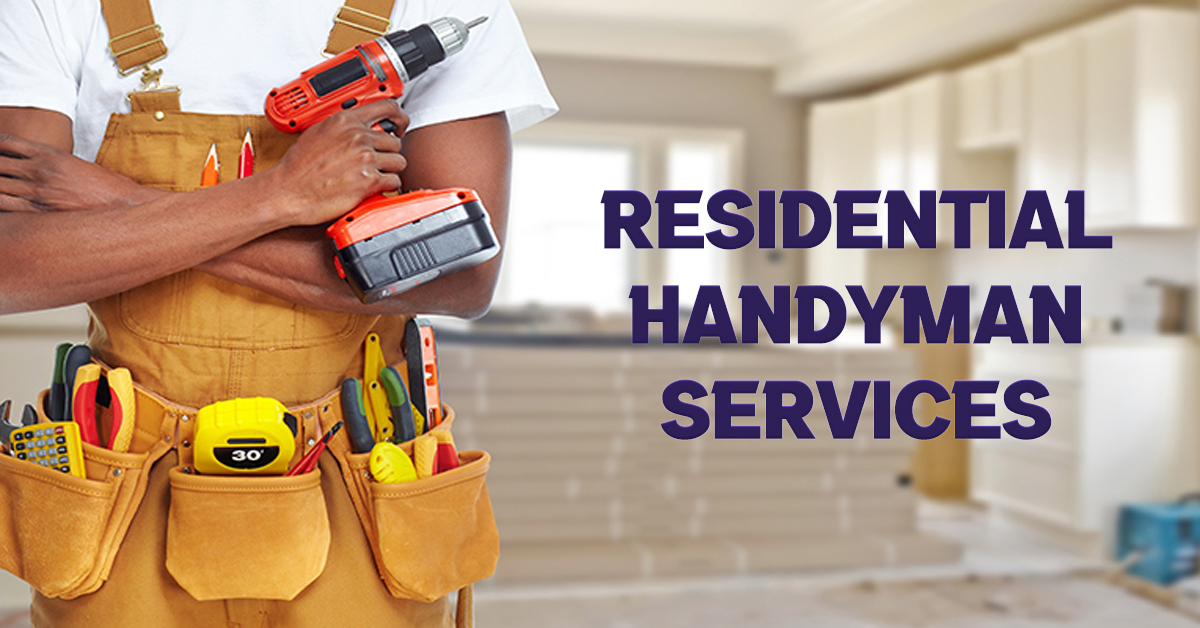Identifying Your Handyman Needs
When you need a handyman, it’s important to first think about what repairs or maintenance tasks you need help with and if the job requires any specific skills. This helps in finding the right handyman service.

Assessing Repair and Maintenance Tasks
Start by making a list of the tasks needing attention. Split them into categories, like minor repairs or ongoing maintenance. Minor repairs include things like fixing leaky faucets or patching drywall. Maintenance might involve regular tasks such as gutter cleaning or yard work.
Consider the urgency of each task. Do you need something fixed right away, or can it wait? Prioritize tasks based on urgency and importance. This way, you’ll know what must be done first and what can be dealt with later on.
Determining Specialization Requirements
Some tasks need specific skills. For instance, electrical or plumbing jobs might need a handyman with specialized training and certifications. If a task involves woodworking or installing cabinets, you might need someone with carpentry skills.
Verify the handyman’s experience and training for tasks requiring special skills. Looking for certifications or licenses can also help ensure they are qualified. Ask for examples of previous work to see if their experience matches what you need for your home repair needs.
Remember, having a qualified handyman ensures the job is done safely and correctly. It also gives peace of mind knowing that your home is in good hands.
Evaluating Handyman Qualifications
When hiring a handyman, look for qualified professionals who meet industry standards. Make sure they carry insurance, have the right licenses, and a solid track record. Customer reviews and past project examples can help you assess their reliability and quality of work.
Verifying Licensing and Insurance
Before hiring a handyman, check if they have the required licenses. Licensing ensures that they comply with local regulations and standards. Each state or region may have different requirements, so it’s important to confirm that the handyman is properly licensed to perform the intended work.
Insurance is another critical factor. A handyman should have both liability insurance and workers’ compensation. This protects you from any financial responsibility if something goes wrong during the project, such as accidental property damage or workplace injuries.
Ask for proof of these documents. Legitimate professionals will have no issue providing this information. It can also be a good idea to contact the issuing agencies to verify the validity of these documents.
Checking Experience and Expertise
Experience plays a vital role in selecting the right handyman. Look for someone who has been in business for several years and who has a track record of handling projects similar to yours. Years of experience usually indicate a good level of expertise and reliability.
Assess the handyman’s skills by asking about past projects. A professional with a diverse portfolio can showcase their ability to manage various tasks. You might also request references and contact previous clients to discuss their levels of satisfaction with the work done.
Their expertise can also be highlighted through specialized training or certifications. These credentials show not only competence but also commitment to delivering quality service.
Reading Customer Reviews and Testimonials
Customer reviews and testimonials provide valuable insight into the handyman’s reputation. You can find reviews on platforms such as Google, Yelp, or the handyman’s own website. Positive feedback often suggests a high level of client satisfaction and reliability.
Keep an eye out for patterns in reviews, both positive and negative. Consistent praises for punctuality and quality work are good signs. On the flip side, repeated complaints about missed deadlines or poor communication may be red flags.
Testimonials can also be an important resource. They offer firsthand accounts of others’ experiences, which can help you make a more informed decision.
Understanding Service Logistics
Choosing the right handyman service involves looking at how well each service handles their tasks. You should think about their reliability, how they handle communication, and what their payment terms are. These elements can greatly affect your satisfaction with the service you receive.
Availability and Punctuality
Why Availability Matters
Availability means the handyman service can work when you need them. Check if they offer flexible hours or can handle emergencies. This ensures your needs are met promptly. If they can’t fit you into their schedule, they might not be the right choice.
The Role of Punctuality
Punctuality is a key indicator of professionalism. A handyman who arrives on time demonstrates respect for your schedule and commitment to their work. Be cautious of frequent complaints about delays, as this might indicate poor time management.
Effective services will contact you if they are running late, reflecting good communication practices and accountability.
Communication and Payment Terms
The Importance of Clear Communication
Clear communication ensures you understand the scope of work and any changes that might occur. Handyman services should:
- Provide detailed estimates
- Keep you updated throughout the job
- Explain complex terms in simple language
It’s crucial to work with a handyman who is easily reachable and communicates effectively.
Understanding Payment Terms
Payment terms should be clear to avoid surprises. Consider:
- When and how you’ll be charged
- If a deposit is required before work begins
- Whether payment is due after the job is complete
If something feels off, trust your instincts and ask questions until you’re comfortable. Transparent payment practices indicate a trustworthy service.
Planning and Costing
When hiring a handyman, planning and budgeting are essential to ensure you get quality work at a fair price. Focus on gathering clear estimates and understanding both pricing and workmanship to make the best decisions.
Gathering Estimates and Comparing Pricing
To start, request written estimates from multiple handymen. These should detail labor costs, materials, and any other expenses. Comparing these estimates helps you identify competitive pricing.
Consider pricing structures that the handyman offers. Some charge hourly, while others might offer a flat rate for certain tasks. It’s important to know what each covers so you can budget accurately.
Be cautious of unusually low estimates. These might suggest hidden costs or a compromise on quality. Instead, aim for the best value by balancing cost with proven reliability and previous customer satisfaction.
Assessing Quality of Materials and Workmanship
Quality goes beyond just materials to include workmanship. Ask each handyman about the materials they use. Opt for high-quality materials that suit your budget to ensure long-lasting results.
Examine previous work samples or ask for references to assess the handyman’s craftsmanship. You want someone whose work is efficient and meets high standards.
Finally, confirm that the handyman follows industry practices and standards. Good workmanship minimizes future repairs and costs. Always remember, investing in quality now can save you money in the long run.
Finalizing the Hiring Decision
Before you settle on a handyman, focus on securing service agreements and preparing for their arrival. Ensure you’re clear about the expectations and protect your home during the service.
Securing Service Agreements and Warranties
Why a Written Service Agreement is Essential
Always get a written service agreement before starting any work. This document should clearly outline:
- Project details
- Timelines
- Costs
A clear agreement ensures both parties understand expectations, avoiding misunderstandings and ensuring smooth execution.
Check for Warranties
Warranties protect you against future issues and demonstrate the handyman’s confidence in their work. Key considerations include:
- What is covered under the warranty
- The duration of the warranty
If any part of the agreement or warranty is unclear, ask questions. A reliable handyman will explain their policies without hesitation.
Confirm they have liability insurance to protect against accidental damages during the work. This is essential for your peace of mind.
Preparing for the Handyman’s Arrival
Preparing Your Home
To ensure a smooth process, prepare your home before the handyman arrives:
- Clear the work area of any obstructions or valuables to give the handyman easy access.
- If possible, arrange a quiet area to store tools, keeping the workspace organized.
- Provide necessary amenities such as power outlets and adequate lighting.
Safety and Communication
Communicate any specific instructions or preferences regarding the work. To ensure safety:
- Keep pets and children away from the work area.
- Inform the handyman about potential hazards or unique requirements.
Proper preparation not only contributes to a successful and hassle-free experience but also ensures the handyman can complete their work efficiently.
Frequently Asked Questions
What do most handymen charge per hour?
Typically, a handyman charges between $50 to $100 per hour. Rates vary based on location, experience, and the complexity of the job. To ensure fair pricing, get multiple quotes and compare rates in your area.
What questions should I ask a handyman before hiring?
Important questions to ask include:
- Their experience and availability
- Specific expertise related to your project
- Details about licensing and insurance
- References from past clients
- How they handle unexpected issues
What is the best website to find handyman work?
Websites like Handyman.com, Angie’s List, and Thumbtack offer directories and reviews of local professionals. These platforms make it easy to compare handyman services and find a qualified professional near you.
What is the best business structure for a handyman?
Many handymen operate as sole proprietorships due to the simplicity and ease of management. For personal liability protection, forming a Limited Liability Company (LLC) is a smart choice, especially if you plan to grow your business or hire employees.
How should I determine if a handyman is insured and bonded?
Always ask for proof of insurance and bonding. Verify the documentation includes valid certificates for liability insurance and bonding. This protects you in case of property damage or incomplete work.
What are the important factors to consider when looking at handyman reviews?
Focus on reviews that mention:
- Reliability and punctuality
- Quality of work
- Consistency in performance
Pay attention to how the handyman addresses negative feedback, as it reflects their commitment to customer service.



